Can Aromatherapy Really Help You Sleep Better?
Struggling to sleep? Discover how essential oils can calm your brain and improve rest—backed by science, and easy enough to try tonight.

What if the fastest way to sleep better was right under your nose? If you’re tired of tossing and turning and ready to try something simple that actually works, it’s time to give scent a shot.
Aromatherapy isn’t a wellness fad—it taps into how your brain naturally winds down. You’re not tricking your body into sleep. You’re helping it remember how. And once you get it right, the results speak for themselves.
Why Scent Works on Your Brain
Here’s what most people don’t realize: your sense of smell is hardwired into your brain’s limbic system—the zone responsible for emotions, mood, memory, and arousal.
That’s why a single scent can bring you back to a childhood moment or instantly make you feel calm. Unlike sound or sight, scent skips the filter. It goes straight to the parts of the brain that regulate sleep, stress, and relaxation.
Research backs it up. In one study, lavender oil inhalation before bedtime led to longer, deeper sleep and increased slow-wave brain activity—also known as the stage where your body does most of its repair work.
Other studies show that inhaling calming essential oils can reduce heart rate, lower cortisol (the stress hormone), and improve overall sleep quality. But it’s not just about science—it’s about how you use it.

Oils That Actually Help You Sleep
Not every oil is made for sleep. Skip the citrus and peppermint—those are better for waking up. Focus on calming, grounding oils with sedative or anxiolytic (anti-anxiety) properties. Here are a few worth your attention:
Lavender
The all-star. It’s the most studied sleep oil for a reason—shown to deepen sleep and calm a racing mind.
Roman Chamomile
Gentle but effective. Helps reduce anxiety and promotes physical relaxation.
Bergamot
Technically a citrus, but unlike lemon or orange, bergamot has calming properties that support mood regulation and sleep onset.
Cedarwood and Sandalwood
Earthy, grounding, and excellent for slowing an overstimulated brain.
Clary Sage
Less known, but powerful. Shown to reduce cortisol and support deep rest.
How to Use Aromatherapy Effectively
If you’re picturing elaborate spa rituals, relax. Aromatherapy can be stupidly simple. But it does require consistency and intention. Here’s how to fold it into your routine without overhauling your life.
Diffuser
Add 5–10 drops of your chosen oil to a water-based diffuser and run it 30 minutes before bed.
Let the scent fill your room while you prep for sleep—read, stretch, breathe. Make sure the scent fades as you drift off. You don’t need it blasting all night.
Pillow Spray
Combine a few drops of essential oil with water and a touch of witch hazel in a spray bottle. Spritz your pillow or sheets. It’s quick, non-intrusive, and easy to keep by your bedside.
Roll-On Oils
Apply diluted essential oils to your pulse points—wrists, temples, behind your ears, or even the bottoms of your feet. Your skin absorbs the oil slowly, creating a subtle, lasting effect.
Inhaler Sticks or Cotton Pads
Need a travel-friendly option? Aromatherapy inhalers or just a few drops on a cotton ball work just as well. Breathe in slowly for a few minutes before bed.
Whichever method you choose, make it part of your wind-down sequence. Your brain loves routines—it links repeated actions to outcomes.
So when you start associating a specific scent with shutting down for the day, you build a mental shortcut to sleep.
When You’ll Start Noticing Results
This isn’t a one-night wonder. Aromatherapy works best when it becomes part of your nightly rhythm. The first night might feel nice, sure—but the real payoff shows up after several days of consistent use.
You’ll fall asleep faster. Stay asleep longer. Wake up with more clarity. And maybe for the first time in weeks, you won’t feel like you need five cups of coffee just to function.
You’ll also notice shifts in your nervous system during the day. Less irritability. More calm between tasks. Better focus. Because good sleep doesn’t just recharge your body—it sharpens your brain and stabilizes your mood.
Stack the Habit for Even Bigger Wins
Want to boost results? Pair aromatherapy with other light-touch sleep cues. Dim the lights. Do a few minutes of light stretching or box breathing.
Swap your phone for a real book. None of these take more than 10 minutes. Combined with scent, they reinforce the message: “it’s time to shut down.”
You don’t need to overhaul your entire evening. You just need a reliable wind-down that tells your body what’s next. Aromatherapy slots in perfectly.
Final Thoughts
Aromatherapy won’t knock you out like a pill—but that’s the point. It’s subtle, sustainable, and rooted in how your brain actually works.
When used intentionally, it trains your body to fall asleep because it’s ready, not because you forced it. You’ll sleep deeper, recover faster, and function better—without adding another stressor to your already packed routine.
So stop scrolling sleep tips and start building your wind-down strategy. Pick one scent. Try it tonight. Add it to your nightly routine and stick with it for a week.
You’ll be surprised how fast your brain catches on. Better sleep starts with smarter habits. This one’s easy. Start now.




